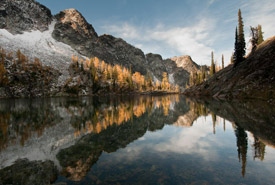Nature-based solutions: Benefits for people and the planet

Alpine Lake on Darkwoods, BC (Photo by Bruce Kirkby)
There is no longer any question, scientifically speaking, that the effects of climate change are increasing both the rate and extent of biodiversity loss, not just in Canada, but globally. When combined with human impacts, such as land conversion and unsustainable land use practices, we are truly facing a threat to our survival.
In response, the Nature Conservancy of Canada (NCC) is increasingly focused on the role that nature-based solutions (NbS), sometimes referred to as nature-based climate solutions, can play in addressing these twin crises of climate change and biodiversity loss. In fact, it is estimated that natural climate solutions can provide more than a third of the solutions necessary for the world to meet the climate targets of the Paris Agreement. It’s therefore well worth our time to investigate all of the important solutions that nature offers.
The International Union for Conservation of Nature defines NbS as: “actions to protect, sustainably manage and restore natural or modified ecosystems, that address societal challenges effectively and adaptively, simultaneously providing human well-being and biodiversity benefits.”
This type of work is precisely what NCC has been doing for many years. We have created protected areas that connect to other protected lands in order to provide species with the ability to adapt to human-caused and climate-related pressures.
But NCC’s work is not solely focussed on protecting some of Canada’s most important and threatened natural areas. We are also interested in restoring degraded or otherwise threatened lands to maintain and help re-establish fully functioning natural ecosystems. A great example includes re-creating wetlands from agricultural lands that were once used for crop production. Wetlands, forests, grasslands and peatlands provide all of us with benefits that we often take for granted. From plentiful, clean water, to clean air and habitat for many different species, recreational opportunities and physical and mental health, nature’s benefits affect us all.
Nature conservation can also contribute to lessening the effects of climate change, through protecting lands that not only store large amounts of carbon, but also absorb or sequester carbon through photosynthesis. Avoiding the release of carbon, combined with carbon absorption by trees, vegetation and other organic matter, is critical in helping lessen the potential impact of future climate change.
Highly credible carbon offset projects, like NCC’s Darkwoods Carbon Project, offer a nature-based solution that addresses the twin crises of biodiversity loss and climate change. The living biomass in Darkwoods stores and sequesters enormous amounts of carbon. It also provides so many other benefits, such as water filtration, air quality purification, species habitat, recreational opportunities and local community benefits.
Companies like Proof Strategies Inc. have long been supporters of Darkwoods and NCC’s nature-based solutions work, and we are grateful for their longstanding support. Other companies, such as Microsoft Corporation, are also blazing paths and leading the way by supporting the increased use of include carbon credits and other innovative approaches, including technological solutions to remove carbon from the atmosphere. We urgently need all of these tools in order to meet these twin crises head on.


